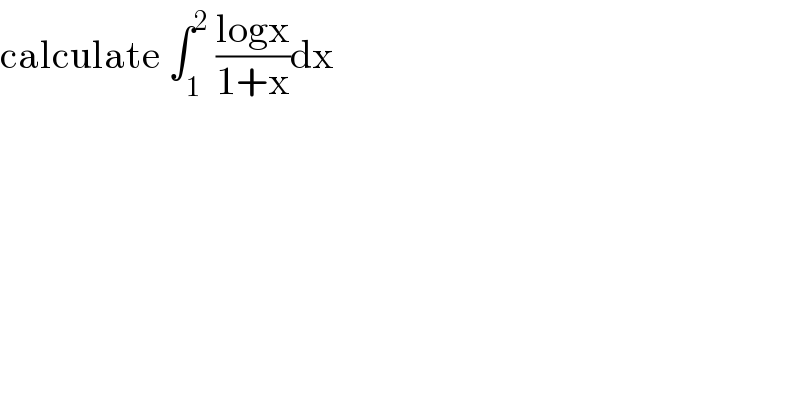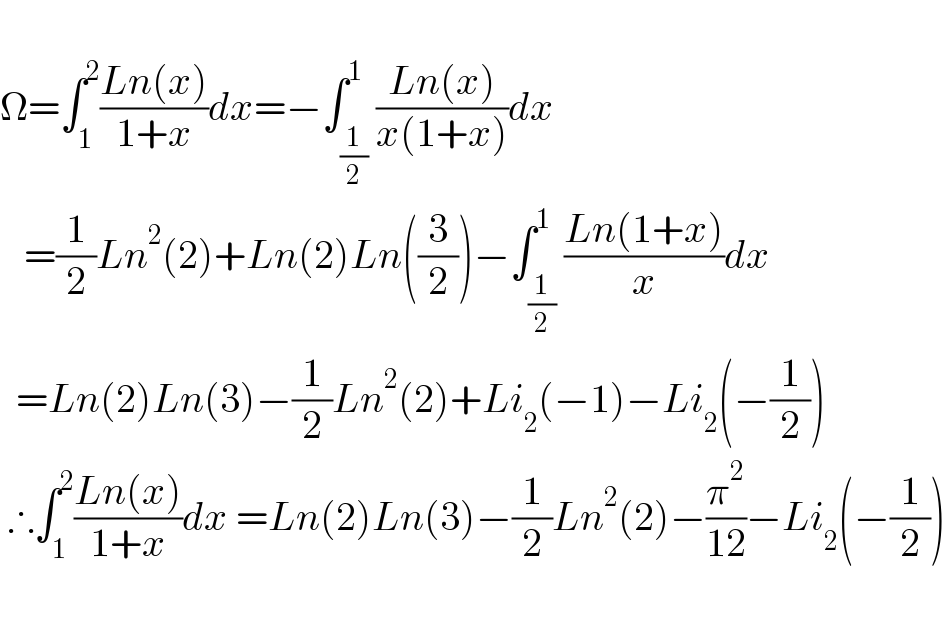Question Number 148564 by mathmax by abdo last updated on 29/Jul/21

$$\mathrm{calculate}\:\int_{\mathrm{1}} ^{\mathrm{2}} \:\frac{\mathrm{logx}}{\mathrm{1}+\mathrm{x}}\mathrm{dx} \\ $$
Answered by Kamel last updated on 29/Jul/21

$$ \\ $$$$\Omega=\int_{\mathrm{1}} ^{\mathrm{2}} \frac{{Ln}\left({x}\right)}{\mathrm{1}+{x}}{dx}=−\int_{\frac{\mathrm{1}}{\mathrm{2}}} ^{\mathrm{1}} \frac{{Ln}\left({x}\right)}{{x}\left(\mathrm{1}+{x}\right)}{dx} \\ $$$$\:\:\:=\frac{\mathrm{1}}{\mathrm{2}}{Ln}^{\mathrm{2}} \left(\mathrm{2}\right)+{Ln}\left(\mathrm{2}\right){Ln}\left(\frac{\mathrm{3}}{\mathrm{2}}\right)−\int_{\frac{\mathrm{1}}{\mathrm{2}}} ^{\mathrm{1}} \frac{{Ln}\left(\mathrm{1}+{x}\right)}{{x}}{dx} \\ $$$$\:\:={Ln}\left(\mathrm{2}\right){Ln}\left(\mathrm{3}\right)−\frac{\mathrm{1}}{\mathrm{2}}{Ln}^{\mathrm{2}} \left(\mathrm{2}\right)+{Li}_{\mathrm{2}} \left(−\mathrm{1}\right)−{Li}_{\mathrm{2}} \left(−\frac{\mathrm{1}}{\mathrm{2}}\right) \\ $$$$\:\therefore\int_{\mathrm{1}} ^{\mathrm{2}} \frac{{Ln}\left({x}\right)}{\mathrm{1}+{x}}{dx}\:={Ln}\left(\mathrm{2}\right){Ln}\left(\mathrm{3}\right)−\frac{\mathrm{1}}{\mathrm{2}}{Ln}^{\mathrm{2}} \left(\mathrm{2}\right)−\frac{\pi^{\mathrm{2}} }{\mathrm{12}}−{Li}_{\mathrm{2}} \left(−\frac{\mathrm{1}}{\mathrm{2}}\right) \\ $$$$ \\ $$
